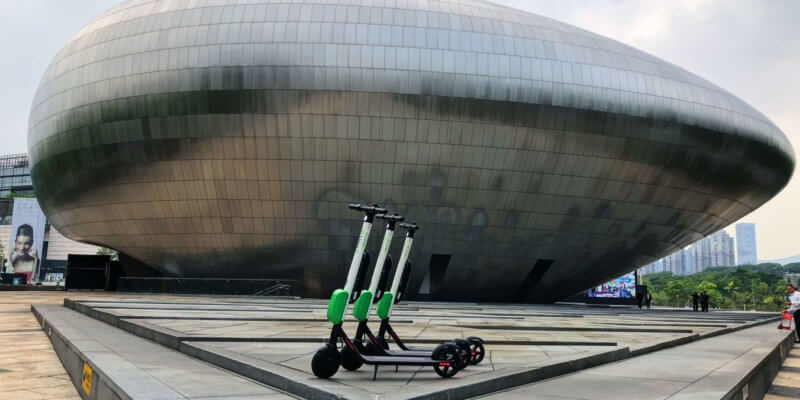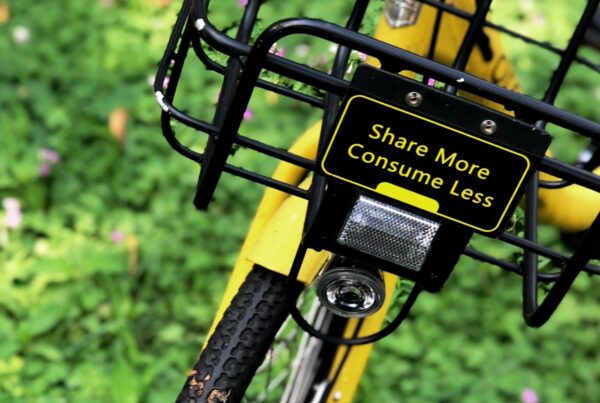Welcome to the Shared-Use Mobility Center’s weekly guide to the most impactful news, thought-provoking articles and innovative technologies that are shaping our transportation future. We believe in sharing information, just like sharing cars, bikes, and scooters, so if there’s anything additional you’d like to see, just drop us a line.
Announcements
New scooter feature on the SUMC blog and the MOD Learning Center.
The Chicago e-scooter pilot ended on October 15, 2019. SUMC assesses the project and gives recommendations for moving forward. The Learning Center expands on this with a pilot overview and an electric scooter learning module. Read the blog entry.
Ridehailing/Carsharing/Carpooling
Chicago’s new plan to raise fees on solo ride-hailing trips while lowering fares on shared rides is a positive though limited step toward promoting more sustainable transportation options. Uber, however, may be thinking legal action.
Ridehailing partnerships are filling gaps in healthcare transportation by giving patients more mobility options for non-emergency medical trips, but are showing growing pains when it comes to wheelchair-accessible vehicles and rider assistance.
Toyota is rolling out new keyless carsharing and rental services in Japan in partnership with Toyota dealers and rental/leasing branches in a bid to shift from car ownership to car use.
Recent carshare woes are leaving more cities with fewer mobility options while other services like ridehailing recapture the shrinking market. Shared mobility choices are what’s needed, not replacements.
Partnerships and Programs
Vancouver agency TransLink’s new Shared Mobility Compass Card can be used to access public transit, Evo Car Share, Modo Co-operative Car Share, and Mobi Bike Share for 14 Vancouver-based employers.
Chicago’s Lincoln Square neighborhood is poised to get more affordable housing, more cycling infrastructure, and an updated Brown Line station according to a new master plan that wants to up density and make the area more pedestrian and bike-friendly.
Idaho will be getting its first set of electric buses from EV transit company Proterra as part of the FTA’s Low or No Emission Program Grants.
Finnish MaaS app Whim has launched in Vienna, its first Central European market, with support for public transport and taxis, with carsharing and dockless scooter options slated for future integration.
Bikesharing and Micromobility
Populus.ai co-founder Regina Clewlow looks at the factors and environments that affect the road to profitability for shared mobility operators and what cities can do to help them thrive properly.
With more low-income programs focused on getting shared mobility in diverse communities, dockless scooters are becoming more widely used by a range of demographics. NBC 4 Washington DC explores programs from Skip, Bird, Lime, Jump, Bolt, and Lyft.
Texas-based micromobility startup Boaz Bikes just launched 100 dockless scooters in Atlanta, boasting the only shared scooters with turn signals and side mirrors.
It’s equity (not equality) in shared mobility services like bikeshare that ensures that everyone, no matter what circumstances they start with, can access and afford a solution to get where they need to go, safely and sustainably. Better Bike Share lays out the importance of focusing on equity in bikeshare.
Transit
Great news from the nation’s second-largest transportation system: the Chicago Transit Authority. The agency will power on with a proposed $1.57 billion in public transit improvements and modernizations but without fare hikes. This is the kind of smart thinking needed to increase transit ridership everywhere.
The “job/worker disconnect” in Cook County suburbs and industrial parks makes it hard for employees to get to work when transit schedules are unreliable and trips are prone to missed connections. Bedford Park, IL is working with the Shared-Use Mobility Center to change that with first/last-mile mobility solutions.
In the face of wide-eyed transportation futurists and cities’ newfound love for autonomous technology, the tried-and-true bus has been (and continues to be) the “workhorse” of the transit world. A little bit of red paint (and policy) goes a long way to making the bus the best option today.
Where is the future of San Antonio’s transportation system headed? Officials, community leaders, and advocates want the region to grow out of car-focused planning initiatives to more people taking transit, walking, cycling, and riding shared scooters/bikes.
Technology
In a struggle about open mobility data and how it’s managed, Los Angeles has suspended Uber’s scooter operating permit over the company’s refusal to join the Mobility Data Specification open data protocol.
Hyundai, self-driving tech company Pony.ai, and Via are working together to launch a free autonomous and electric ridehailing service in Irvine, CA.
US Sen. Chuck Schumer wants to set up a $454 billion electric-vehicle plan to help Americans trade in their gas cars for EVs…he’ll introduce the legislation if the Senate changes hands in 2020.
VW is gearing up to launch a new autonomous-vehicle division called VWAT to take on self-driving tech leaders like Waymo and GM’s Cruise, with help from Audi and Argo AI.
Urban Sustainability
Exxon Mobile, the country’s second-largest emitter of greenhouse gases after Chevron, finally faces the judge in Manhattan for fraudulent practices such as falsifying numbers to make its oil seem like a better investment than renewable energy. Massachusetts and Rhode Island have also filed suit.
According to a new report by the CDP, 85% of the world’s cities are feeling the impact of climate change, yet only 46% are doing something about it. The biggest barrier to climate action, the report states, is “wealth disparity and inequality.”
New York’s bus-exclusive 14th Street is proving so popular the City is looking to do the same for 34th and 42nd and exploring W 49th and 50th too. Ridehailing drivers are less than thrilled.
The challenges posed by the California wildfires stretch far beyond the State.They show how equipped or unequipped we are to deal with climate-fueled disasters that, if nothing is done, are only going to get worse.
Requests for Proposals, Inquiries, and Information
RFP: Real-time Curb Management API
Bay Area Rapid Transit District
San Francisco, California
Deadline: November 20, 2019
RFP: On-Demand Mobility Software
Marin County Transit District
San Rafael, California
Deadline: November 25, 2019
RFP: Environmental Assessment Services
VIA Metropolitan Transit
San Antonio, Texas
Deadline: November 26, 2019
RFP: Zero Emissions Bus Transition Plan
Northern Arizona Intergovernmental Public Transportation Authority
Flagstaff, Arizona
Deadline: November 27, 2019
Did someone forward this to you? You can sign up for our newsletter here.





